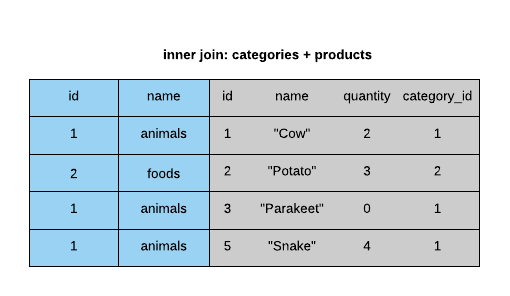Active Record Joins
Here's a quick reference to running join operations in Rails. See Guide to Web Development for a full course on web development.
You can use Active Record joins to query one model based on data from a related table. For example you can return specific categories based on each category's products.
Technical note: joins in Rails runs an SQL 'inner join' operation and returns the records from the model you're operating on.
Models
The previous page discussed setting up relationships between different models. We'll run queries on those models, so here's their code again:
class Category < ActiveRecord::Base
has_many :products
end
class Product < ActiveRecord::Base
belongs_to :category
has_many :likes
end
class User < ActiveRecord::Base
has_many :likes
has_many :liked_products, through: :likes, source: :product
end
class Like < ActiveRecord::Base
belongs_to :user
belongs_to :product
end
Here's sample data for categories and products:

Simple Joins
A simple joins statement lets you return records that have an associated record.
Category.joins(:products)
SQL: SELECT "categories".* FROM "categories" INNER JOIN "products" ON "products"."category_id" = "categories"."id"
This uses SQL to create an inner join table, which joins the categories together with products that have category_id's:

Active record just returns the records for the model you called (categories).
This query returns all categories that have products. It will return a category for every match it finds, which means there can be many duplicates.
| id | name |
|---|---|
| 1 | animals |
| 2 | foods |
| 1 | animals |
| 1 | animals |
To get rid of duplicates, use uniq:
Category.joins(:products).uniq
This will return all categories that have products, without duplicating any categories.
| id | name |
|---|---|
| 1 | animals |
| 2 | foods |
You can also run the query in reverse:
Product.joins(:category)
SELECT "products".* FROM "products" INNER JOIN "categories" ON "categories"."id" = "products"."category_id"
This will return all products that have a category. .joins works for all the Rails relationship types.

Multiple Associations
Here's some new sample data:

You can run a join with multiple tables:
Product.joins(:category, :likes)
This will return all products that have a category and at least one like. To avoid returning duplicate products, you can again use .uniq:
Product.joins(:category, :likes).uniq
SELECT DISTINCT "products".* FROM "products" INNER JOIN "categories" ON "categories"."id" = "products"."category_id" INNER JOIN "likes" ON "likes"."product_id" = "products"."id"
This chart summarizes the different join queries you can run on products:

Nested Associations
Sometimes you'll want to get records based on a nested association:
Category.joins(products: :likes).uniq
This returns all categories that have products that were liked.
| id | name |
|---|---|
| 1 | animals |
| 2 | foods |
SELECT DISTINCT "categories".* FROM "categories" INNER JOIN "products" ON "products"."category_id" = "categories"."id" INNER JOIN "likes" ON "likes"."product_id" = "products"."id"
You could also run a query based on multiple associations. For example, let's say Product has_many reviews and likes.
Category.joins(products: [:reviews, :likes]).uniq
This query would return all categories with products that have reviews and likes.
where
Before looking at more advanced joins queries, let's look at querying a single model.
.where lets you retrieve all items that match a specific condition. For example, this query will return all products with a quantity of 0:
Product.where(quantity: 0)
SELECT "products".* FROM "products" WHERE "products"."quantity" = ? [["quantity", 0]]
You can also specify a range:
Product.where(quantity: 2..5)
Sometimes, you'll need to pass in a string condition to .where which will be directly converted into SQL:
Product.where('quantity > 3')
SELECT "products".* FROM "products" WHERE (quantity > 3)
This will return all products with a quantity greater than 3.
(Note: Be careful not to put user input inside such a query String. See the Rails Guide for more info.)
Conditional Joins
The goal of joins is often to get one model based on specific conditions in another model. For example, you may want to get all Categories that have products with a quantity equal to 0:
Category.joins(:products).where(products: {quantity: 0})
SELECT "categories".* FROM "categories" INNER JOIN "products" ON "products"."category_id" = "categories"."id" WHERE "products"."quantity" = ? [["quantity", 0]]
You can pass in any SQL conditions as a string:
Category.joins(:products).where('products.quantity > 3')
SELECT "categories".* FROM "categories" INNER JOIN "products" ON "products"."category_id" = "categories"."id" WHERE (products.quantity > 3)
This returns all categories that have products with a quantity greater than 3.
As before, you'll generally want to add .uniq to these queries avoid returning duplicate categories:
Category.joins(:products).where('products.quantity > 3').uniq